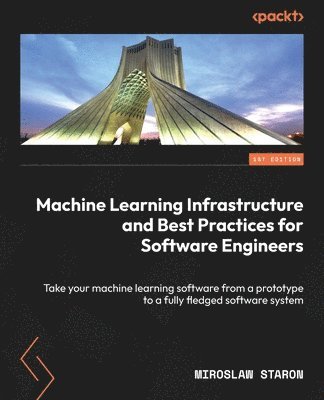
- Format
- Häftad (Paperback / softback)
- Språk
- Engelska
- Utgivningsdatum
- 2024-01-31
- Förlag
- Packt Publishing Limited
- Dimensioner
- 235 x 190 x 18 mm
- Vikt
- ISBN
- 9781837634064
- 595 g
Machine Learning Infrastructure and Best Practices for Software Engineers
Take your machine learning software from a prototype to a fully fledged software system
- Skickas från oss inom 7-10 vardagar.
- Fri frakt över 249 kr för privatkunder i Sverige.
Passar bra ihop
De som köpt den här boken har ofta också köpt AI-Driven Leader av Geoff Woods (inbunden).
Köp båda 2 för 863 krKundrecensioner
Fler böcker av Miroslaw Staron
-
Automotive Software Architectures
Miroslaw Staron
-
Software Development Measurement Programs
Miroslaw Staron, Wilhelm Meding
-
Action Research in Software Engineering
Miroslaw Staron
-
Accelerating Digital Transformation
Jan Bosch, Jan Carlson, Helena Holmström Olsson, Kristian Sandahl, Miroslaw Staron
Övrig information
Miroslaw Staron is a professor of Applied IT at the University of Gothenburg in Sweden with a focus on empirical software engineering, measurement, and machine learning. He is currently editor-in-chief of Information and Software Technology and co-editor of the regular Practitioner's Digest column of IEEE Software. He has authored books on automotive software architectures, software measurement, and action research. He also leads several projects in AI for software engineering and leads an AI and digitalization theme at Software Center. He has written over 200 journal and conference articles.
Du kanske gillar
-
Tech Coup
Marietje Schaake
Inbunden -
Co-Intelligence
Ethan Mollick
Trade paperback (UK) -
Careless People
Sarah Wynn-Williams
Inbunden


